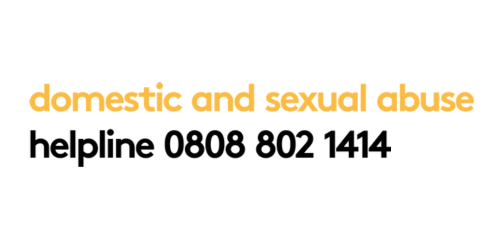Domestic Abuse
Domestic abuse refers to incidents or patterns of behaviour where both individuals are aged 16 or over and are personally connected, for example: current or former partners, family members, or people that share parental responsibilities. Current legislation under the Domestic Abuse Act 2021 also recognises children as victims in their own right.
Domestic abuse is not limited to physical violence, It can happen to anyone, regardless of gender, sexuality, age, or background and it can occur or escalate after a relationship has ended.
Call us now on 0808 802 1414
or email help@dsahelpline.org
Physical
Physical abuse is defined as intentionally causing injury, trauma, or bodily harm to a person by way of physical contact. It can include:
- hitting/slapping/punching/kicking/pushing/shoving
- restraint
- trapping someone
- strangling
- throwing objects at someone
- burning
- preventing someone from eating, sleeping, or accessing medical care
Legal
Legal abuse refers to the misuse of legal systems or processes by an abuser to exert control, intimidate, or harass a victim. This can include:
- filing frivolous legal actions such as custody disputes or complaints
- threatening legal action
- manipulating family court proceedings
- not complying with court orders such as not paying child support
- using legal proceedings to delay divorce or financial settlements
Verbal
Verbal abuse is defined as intentionally causing hurt or upset through the use of words and non-physical actions. This can include:
- name-calling
- yelling/screaming
- threats of harm (to the victim, their children/loved ones, their pets, or their property)
- constant criticism or belittling
- humiliation
- coercive control
- blaming the victim for things outside their control
Religious
Religious abuse is a form of domestic abuse where religion or spiritual beliefs are used to control, manipulate, intimidate, or harm another person. This can include:
- using religious teaching to justify abuse
- preventing a victim from practicing their faith
- forcing a person to participate in religious activities against their will
- mocking or belittling a person’s faith
- forcing someone to engage in activities that go against their religion
- destroying religious texts or symbols
Emotional
Psychological or emotional abuse is involves behaviours that harm a person’s mental and emotional wellbeing. This can include:
- gaslighting (psychological manipulation to make a person doubt their memories or sanity)
- isolation
- criticism or belittling
- trapping someone
- threats of abandonment
- threats of self-harm made by the perpetrator
- victim blaming
- using guilt or shame to control decisions
- monitoring movements or communications
HBA
Honour-based abuse (HBA) is a form of domestic abuse where violence, coercion, or control is carried out to protect or defend the perceived “honour” of a family or community. This can include:
- forced marriage
- restrictions on education, social, or work life
- surveillance or intimidation by family or community
- violence or threats for perceived dishonour
- virginity testing
- murder or attempted murder (‘honour killings’)
- abandonment or forced removal abroad
Financial
Financial abuse occurs when a perpetrator exerts power and control over a victim’s financial situation. It can include:
- providing an allowance and closely monitoring it is spent
- preventing access to bank accounts
- preventing the victim from working or studying
- refusing to contribute to household expenses
- running up debts in the victim’s name
- withholding money for food, clothing, or medication
- forcing the victim to take out loans or credit
FGM
Female Genital Mutilation (FGM) refers to procedures that involve the partial or total removal of the external female genitalia, or other injury to the female genital organs, for non-medical reasons. It is carried out due, in part, to:
- cultural beliefs
- social pressure to conform to community norms
- control of female sexuality
- misguided religious interpretations
- Ideals of cleanliness or beauty
